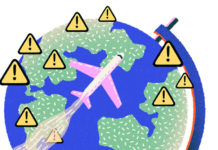Want to get The Morning by email? Here’s the sign-up.
Good morning. The economic downturn is hitting young workers especially hard. Trump claims to be taking an unproven medication. And there is encouraging vaccine news — but an actual vaccine is still a long way away.
Early news about medical treatments — like yesterday’s announcement that a coronavirus vaccine has shown positive results in eight people — can feel both exciting and frustrating.
The frustrating part is the timing. Even if all continues to go well with the research into this vaccine, it won’t be available until late this year or early next year. Between now and then, the vaccine will have to endure two more research trials, one involving hundreds of people and the other involving thousands.
Given the virus’s terrible toll, that long process can seem strangely lacking in urgency. But scientists insist that it isn’t. Here are the key reasons they say that there are no easy or fast routes to a vaccine:
Early results don’t always stand. In 2015, the French drug company Sanofi began selling the first vaccine for dengue. The drug had made it through multiple research trials — although some researchers believed Sanofi had ignored worrisome signs. Sure enough, as children in the Philippines began using it, some contracted an even worse form of dengue. Today, use of the vaccine is highly restricted.
In recent testimony, Dr. Anthony Fauci, the nation’s top infectious-disease expert, noted that a coronavirus vaccine could suffer from the same problem.
The larger point is that drugs that look good in small, initial studies often look less good when they’re tested in more people.
Side effects matter. A vaccine doesn’t merely need to work, as Katie Thomas, a Times reporter covering pharmaceuticals, explained to me. It needs not to have side effects that cause more damage than the virus itself.
This coronavirus seems to kill only a small percentage of people who get it. The side effects have the potential to do more damage, because any coronavirus vaccine will be given to billions of people, including many with underlying health problems.
It could lead people around the world to stop taking vaccines that actually work. That’s what happened in the Philippines after the dengue scandal.
All of which is a reminder that promising early results — like yesterday’s — often prove fleeting. Only about 10 percent of drugs that clear the first research phase ultimately make it to market.
In other virus developments:
THE MORNING FIVE
1. Fired watchdog was investigating arms sales
The State Department inspector general fired by Trump on Friday was in the final stages of an investigation into whether Secretary of State Mike Pompeo improperly allowed weapons sales to Saudi Arabia and the United Arab Emirates.
Trump, speaking on Monday, said of his decision to fire the inspector: “I don’t know him. Never heard of him. But I was asked by the State Department, by Mike.”
2. A swift end to ‘hero pay’
Several of the country’s biggest employers have raised the wages of their essential workers through “hero pay”: some extra money on top of normal hourly salaries. Now there is a split between companies that plan to end those programs and those that will continue them.
Amazon warehouse workers will lose their extra $2 an hour at the end of this month, and Starbucks baristas will lose their extra $3. Other companies that had planned to end the additional pay — including Target and Kroger, the nation’s largest supermarket chain — have reversed course, apparently in response to public pressure, as The Star Tribune and The Cincinnati Enquirer have reported.
3. An economic crisis for the young
Young people — many of them recent graduates saddled with debt — are entering a job market devastated by the pandemic. Studies of previous economic downturns have shown that they can create lasting disadvantages for younger workers.
Already, the unemployment rate has risen most sharply for Americans under 35, and especially those under 25:
4. Trump says he’s taking an unproven medication
The president announced yesterday that he has been taking hydroxychloroquine, an anti-malaria drug, to protect himself from the coronavirus, despite a lack of evidence that it can prevent infection. Medical experts sharply criticized him, saying the drug brings significant risks.
5. A fear realized for black runners
“When will be the right time to explain to a 9-year-old the wariness that comes every time I lace my clunky green sneakers and pad through the streets in our almost entirely white Seattle community?” Kurt Streeter, a sports reporter at The Times who often jogs with his son, writes in an opening essay.
Here’s what else is happening
BACK STORY: THE HURDLES FOR TEAM SPORTS
The major sports leagues seem to be moving rapidly toward resuming games. N.B.A. teams are holding workouts. The N.H.L. is considering an expanded playoffs. And Major League Baseball has a plan that would allow Opening Day in July.
To make sense of it all, I asked for guidance from Oskar Garcia, a deputy sports editor. His advice: Fans shouldn’t get too excited yet.
Individual sports — like car racing, golf and tennis — have easier paths. But team sports create inherent problems during a pandemic. They require dozens of athletes to come in close contact, touching each other during games and getting dressed in cramped locker rooms.
It’s true that the leagues are trying to minimize this contact. Baseball would encourage players not to shower in the locker room after games (which could make for some uncomfortable rides home in August). But the leagues can’t eliminate human contact entirely. To play the games, as Oskar says, “you need to have some people together.”
As Billy Witz, who covers college football, recently wrote: “Imagine if the starting left tackle tested positive for Covid-19 the day before a game. What would happen to the rest of the offensive line that had been in meetings with him all week or the defensive ends that had been knocking heads with him in practice?”
PLAY, WATCH, EAT, SAVE
The new face of restaurants
Restaurant-quality food at home: Try this recipe for chicken with vinegar from the chef Jean-Georges Vongerichten, which gets its punch from butter, shallots and good red-wine vinegar.
Suze Orman is back
The famous financial adviser had slowly been winding down, fishing and relaxing in the Bahamas home where she has spent much of the past five years.
But now the pandemic — and the resulting economic crisis — has made Suze Orman as “in demand as Lysol wipes,” Jacob Bernstein writes in a profile. Orman, who has written more than a dozen books, wants taxes on the wealthy to “skyrocket,” and she says that having an emergency fund can be even more important than paying off debts.
It’s a salamander’s world
Many frogs and salamanders are killed crossing roads during their annual migration, but this spring is different. Scientists are excited to measure the impact that the lack of car traffic has on the creatures.
Thanks for spending part of your morning with The Times. See you tomorrow. — David
P.S. Thanks to the readers who wrote to say they missed seeing Bill Russell’s name on yesterday’s list of the most successful team athletes of the past 50 years. If we had extended the window to 60 years, Russell — who won a remarkable 11 N.B.A. championships in 13 years, ending in 1969 — would have ranked above even Michael Jordan.
Lauren Leatherby, Ian Prasad Philbrick and Sanam Yar contributed to The Morning. You can reach the team at themorning@nytimes.com.
Source : Nytimes













